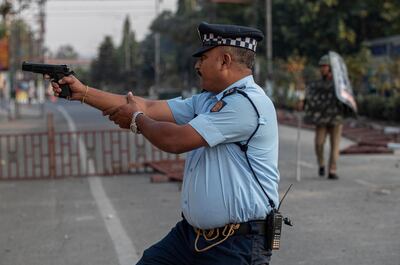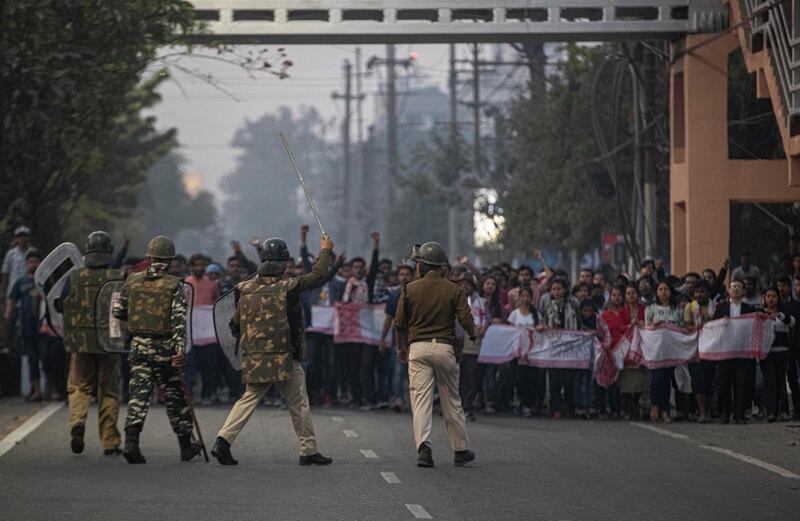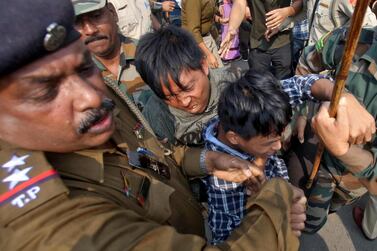Two people were killed in north-east India on Thursday after police opened fire on crowds who defied a curfew to protest against a law granting citizenship to millions of immigrants.
Hospital officials in Guwahati, a city in Assam state, said two people were treated for gunshot wounds but later died.
Authorities called in the army to bring the situation under control and restricted internet access and messaging services as mobs attacked homes of politicians and government buildings across the state and burnt down two railway stations.
Scores of passenger flights were cancelled.
“There is total chaos,” said Dr Bishnu Saikia, of Guwahati University. "One third of Assam's population is on the streets.
"There is sloganeering. The protests are spreading like wildfire. Nothing can stop these protesters."

Demonstrations have rocked the state since Monday, when the lower house of Parliament passed a law granting citizenship to Hindus, Sikhs, Parsees, Jains and Christians from Pakistan, Bangladesh and Afghanistan who arrived before 2015.
Prime Minister Narendra Modi's Hindu nationalist government said the citizenship amendment bill would help members of the religious groups who fled persecution in those countries.
The bill, which was passed by the upper house on Wednesday, has been criticised for its discrimination against Muslims.
It is expected to benefit millions of Hindus who came from Bangladesh, which was known at the time as East Bengal as it became a province of Pakistan after India’s partition in 1947, and after the country's independence in 1971.
The north-east region, between China, Myanmar and Bangladesh, is home to diverse religious and ethnic groups wanting to keep their culture and resources, leading to decades of conflict and movements calling for separation from India.
The protesters in Assam say the new law breaches a 1985 accord between Assamese groups and New Delhi.
The agreement came after six years of protests by student unions for the exclusion of undocumented immigrants from Bangladesh who arrived after 1971.
The parties agreed that no one who arrived after December 31, 1971 would be allowed to claim legal status.
"This bill is an attack on our culture, language and traditions," Shankar Jyoti Baruah, a member of the All Assam Students' Union that is leading the protests, told The National.
"If Bengalis are given citizenship, their population would be more than the indigenous population.
"They will threaten indigenous language, culture and heritage and eat up a major share of employment."
The bill failed to clear parliament during Mr Modi’s first term because he lacked a majority in the upper house.
Muslim groups say the law allows all other major ethnic and religious groups an easy route to citizenship after the introduction of a National Citizenship Register in Assam disenfranchised thousands from their community.
Nearly two million people living in Assam were excluded from the register this year after failing to prove their nationality with documents such as birth certificates.
They must take up their cases at local tribunals to prove their Indian citizenship or remain in detention camps.
Many people across in India lack official documents because of widespread illiteracy.
Critics of the citizenship law said it would enable Bangladeshi Hindus left out of the register to become citizens.
The Indian Union Muslim League, a political party, has challenged the legislation in the Supreme Court, saying it breaches the principles of equality and secularism enshrined in India's constitution.
“Illegal migrants are a class by itself, and therefore, any law which is applicable to them should be irrespective of any religion, caste or nationality basis,” the party said.
“The preamble of our constitution envisages that India is a secular country and therefore every law which is passed by the Parliament has to be religion-neutral.”






